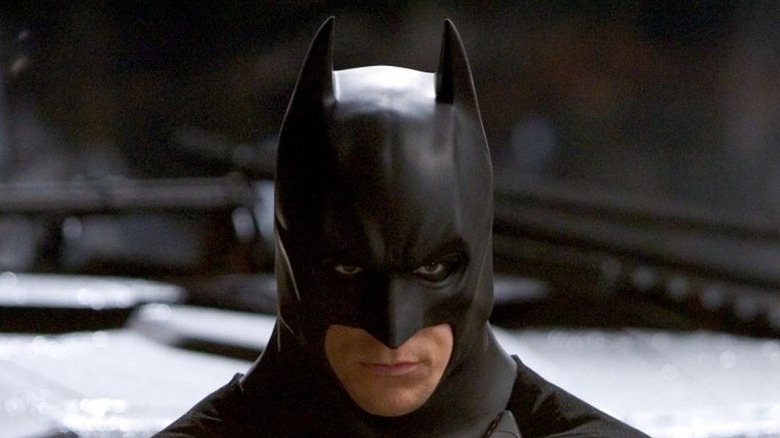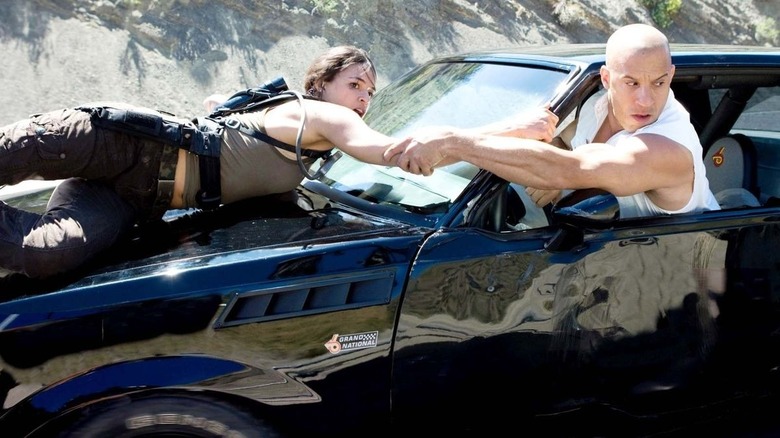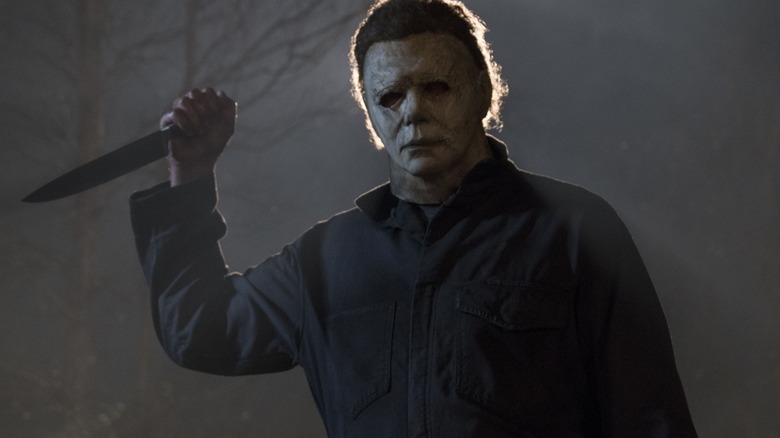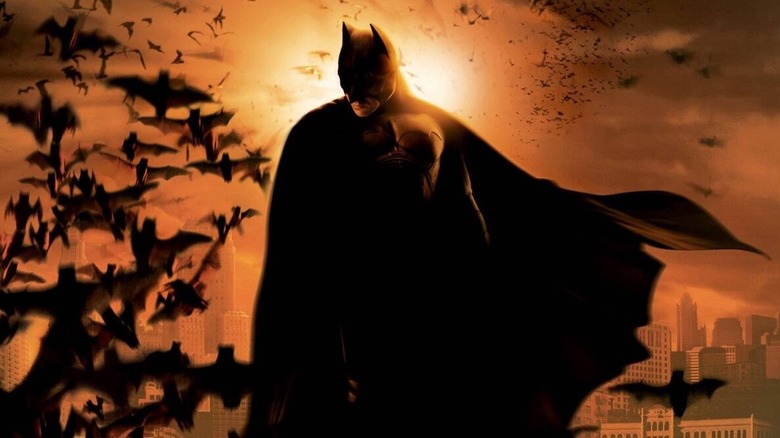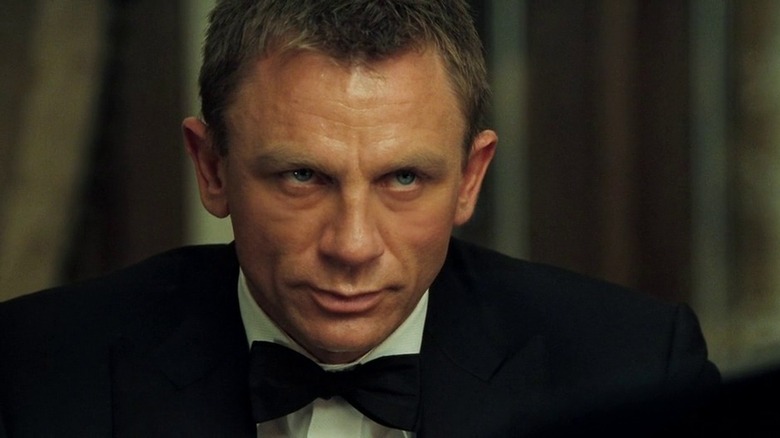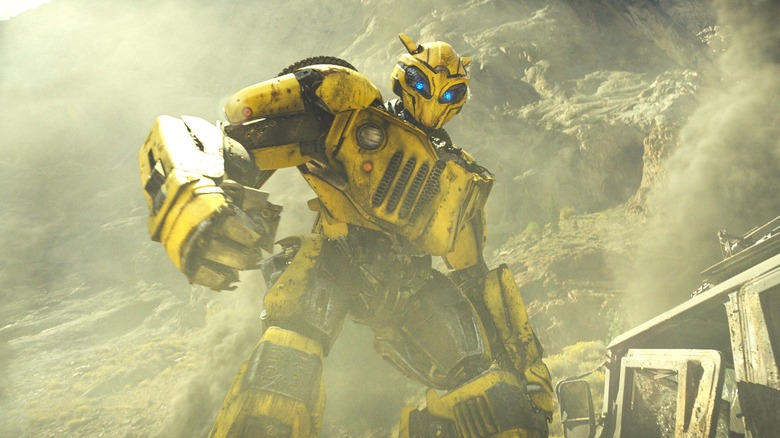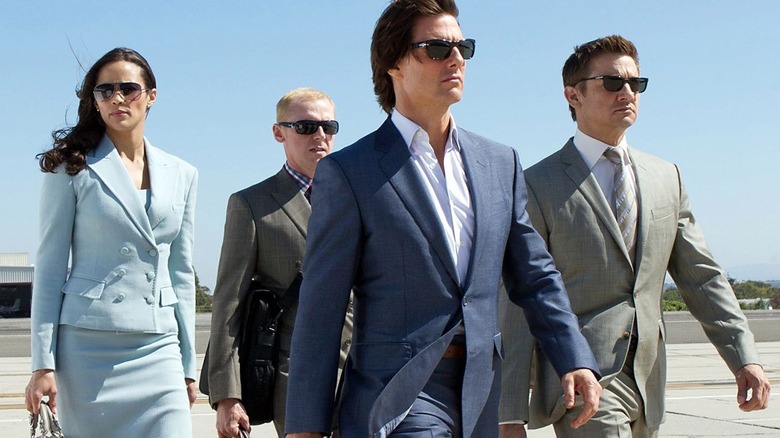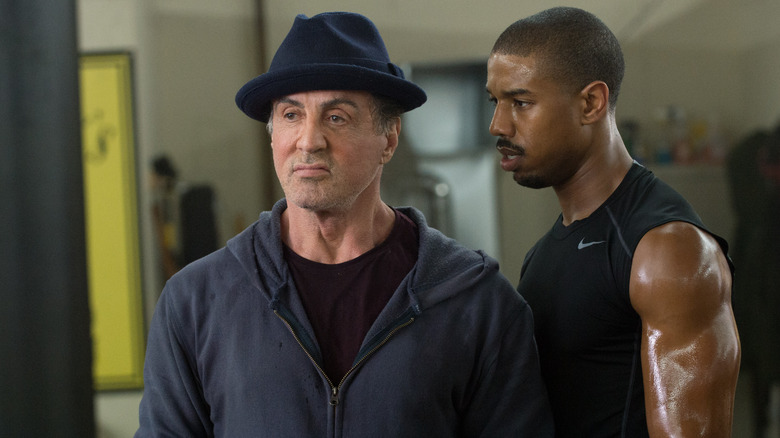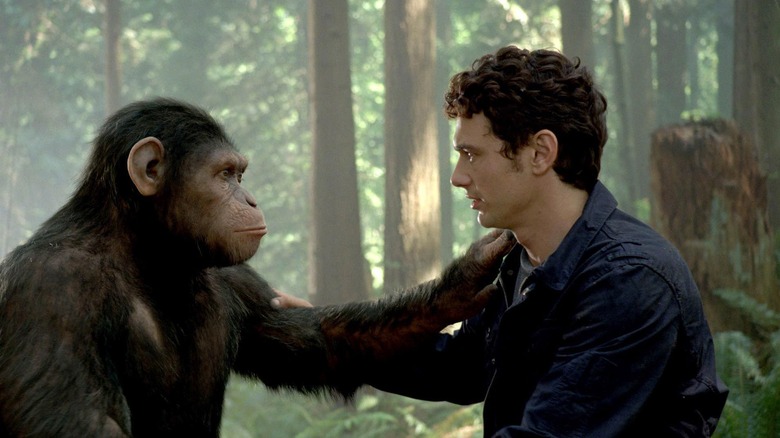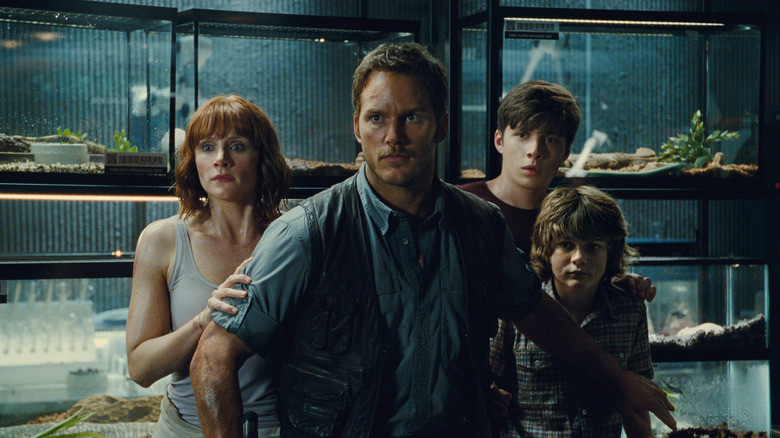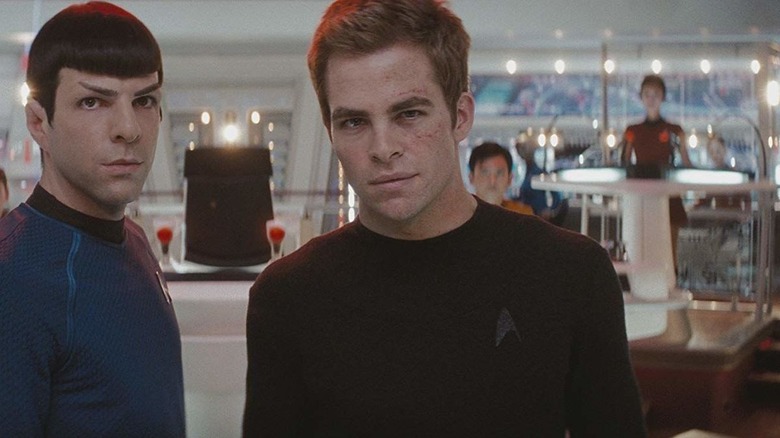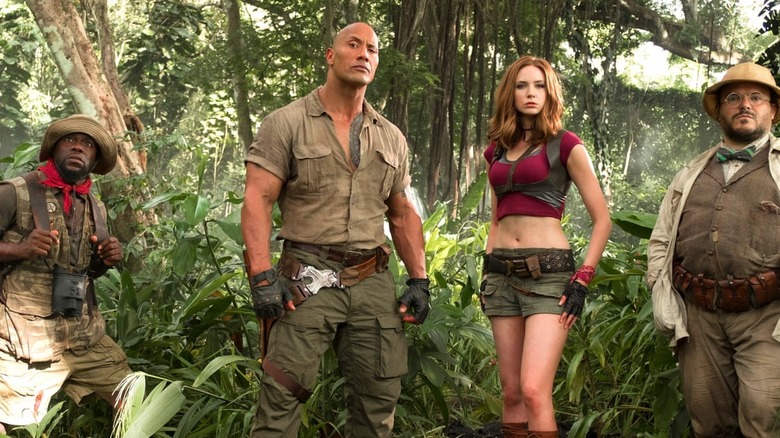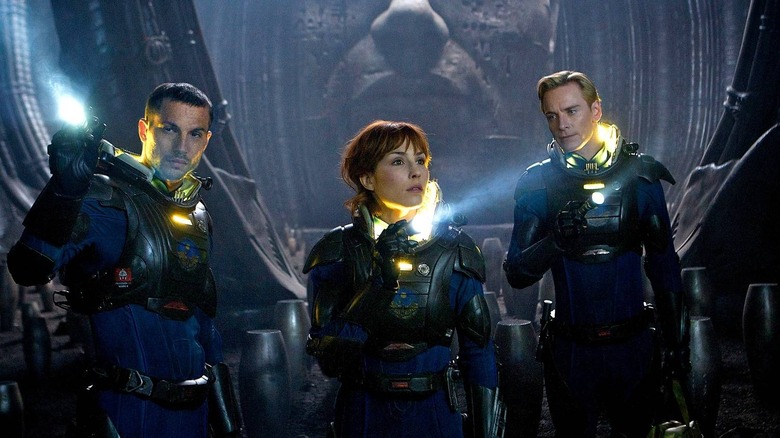Times Movie Sequels Saved The Franchise
Every franchise has its down moments. Some installments just miss the mark, and occasionally make people question the viability of certain pop culture properties. It's in those moments that even producers and movie studios can feel like it's time to put an franchise on the shelf. But like a rainbow coming after a storm, many movie franchises have seen their weakest installments followed by a sequel that managed to set everything back on track. It's these sequels that don't just entertain audiences, they outright save a franchise.
Such an impressive achievement can be attributed to factors that vary greatly from one movie to another. Sometimes the producers just brought things back to basics, while other lucrative entries managed to deliver on what fans had always wanted to see from a certain series. Whatever caused these rejuvenating features to resonate with moviegoers, these film franchises owe their continued existence to these sequels.
Fast & Furious
Right after "The Fast and the Furious: Tokyo Drift" did disappointing business at the box office, Universal Pictures was at a crossroads. The studio wanted to continue using the "Fast & Furious" brand, but they almost went in the direction of delivering direct-to-video titles that had the "Fast & Furious" branding. The thought of "Fast & Furious" going the route of "American Pie" or "Tremors" — Universal franchises endlessly spouting home video follow-ups — must send chills up the spine of every "Fast & Furious" fan. There would be no way such titles could afford the kind of gravity-defying spectacle that the most recent installments in this franchise have been defined by.
That's when Vin Diesel and the cast of the original "Fast and the Furious" stepped in to headline the 2009 feature "Fast & Furious." By reuniting this cast for the first time since 2001, they finally gave fans the sequel they wanted. Dominic Toretto and Brian O'Connor came together once again on an action-packed adventure. But this feature went beyond just satisfying the already-converted fanbase of these motion pictures. It was also a feature that took the series to new box office heights, broadening the appeal and reaching new audiences.
Not only did "Fast & Furious" resurrect the franchise, it also saved it from going to the DVD bin at your local Walmart.
Halloween (2018)
The "Halloween" franchise hadn't just hit a slump, it had been in one practically since the original 1978 John Carpenter film debuted. While the occasional sequel in this franchise, like "Halloween III: Season of the Witch," had garnered positive marks, the majority of these follow-ups had largely invited scorn. Stunt-casting like Busta Rhymes or Rob Zombie's superfluous 2007 remake of the original "Halloween" mean the general public avoided the franchise.
The 2018 take on "Halloween," the first entry in the series in nearly a decade, had to figure out how to get people invested in the horrors of Michael Meyers again. This was accomplished by bringing Jamie Lee Curtis back as Laurie Strode and emphasizing her trauma-laden perspective as she prepares for the inevitable return of Meyers. Grounding things in such a distinctly human quality, not to mention offering nostalgia with the return of Curtis, restored luster to the "Halloween" name. Not only was this installment a critical hit, but it was also a massive success at the box office.
Batman Begins
How do you solve a problem like Batman? That was the challenge Warner Bros. faced at the start of the 2000s. One of the most popular superheroes to ever exist, Batman was still big in the toy aisle, but "Batman & Robin" had soured the character's potential as a big-screen entity. Could the series ever get back to the kind of box office heights hit by the first two Tim Burton "Batman" movies a little over a decade earlier? It turned out the answer to that question was yes thanks to the arrival of "Batman Begins."
"Batman Begins" managed to flourish financially by basically being the total opposite of every preceding "Batman" movie from Warner Bros. Batman himself would be the focus of the project, instead of a colorful villain. The grim tone evoked the atmosphere of the most beloved "Batman" comics by die-hard fans of the character. By going these routes, "Batman Begins" wasn't just (at the time) the biggest superhero movie of all time, but it surpassed the domestic haul of its three direct predecessors and saved the "Batman" franchise from its downward trajectory in the public eye.
Casino Royale
The early 21st-century was not an ideal time for the James Bond franchise. The last entry in the series headlined by Pierce Brosnan, "Die Another Day," had made some coin at the worldwide box office but it ended his tenure on a low note critically thanks to rampant complaints about the dodgy visual effects and product placement. It was time once again not only for a new actor to inhabit the 007 moniker but for a new style to get incorporated into the exploits of James Bond.
When it came time for "Casino Royale," the producers of the Bond movies opted to zag when audiences expected them to zig. This was a more grounded take on James Bond, with an incarnation at the start of his superspy career. His lack of experience made him more prone to mishaps, which in turn made him more vulnerable and relatable to moviegoers. These qualities, as well as a focus on realistic brutal action, separated "Casino Royale" from its direct predecessors and made Bond fit snugly into a pop culture environment fixated on grim and gritty blockbusters. Making these creative readjustments proved to be catnip for audiences worldwide. "Casino Royale" was a global box office smash and left memories of earlier less beloved Bond adventures in the dust.
Bumblebee
The "Transformers" sequels had never been critical favorites but they were usually reliable moneymakers. As late as 2014, "Transformers: Age of Extinction" cracked $1 billion worldwide. But with "Transformers: The Last Knight," a funny thing happened. For once, the box office receipts were as bad as the reviews. Sinking to just $605.4 million worldwide, "The Last Knight" made nearly half of what "Transformers: Dark of the Moon" had amassed globally just six years prior. Even worse, it was eventually revealed that this entry in the series lost Paramount Pictures over $100 million, a staggering turnaround from when these movies could be reliably expected to make money hand over fist.
After such a development, it was clear that the "Transformers" saga required a major boost. Drastic measures were needed if this series wanted to continue. Such an approach was realized through the following entry after "The Last Knight," "Bumblebee." This one revitalized the "Transformers" series by basically eschewing all the known conventions of the franchise. Director Michael Bay was traded out for Oscar-nominated filmmaker Travis Knight. A more character-driven family-friendly aesthetic replaced the loud and adult-skewing tone of the original five installments. The film was also released over Christmastime, where it could have room to breathe and build up word-of-mouth. "Bumblebee" didn't shatter box office records but it became a solid earner that turned a profit and proved that the "Transformers" saga could endure even after "The Last Knight."
Mission: Impossible - Ghost Protocol
For a hot minute, it did look like Ethan Hunt had finally found a mission he wouldn't be able to accomplish: the task of keeping the "Mission: Impossible" franchise a financially viable summer blockbuster series. The franchise seemed to have hit a massive brick wall with "Mission: Impossible III," which took the series to a whole new low at the box office. Between this and questions in the mid-2000s over Tom Cruise's viability as a movie star, it looked like the "Mission: Impossible" series might be done for.
Then, the fourth film in the series, "Mission: Impossible — Ghost Protocol," hit theaters in December 2011. Arriving nearly six years after its predecessor, "Ghost Protocol" brought on director Brad Bird and emphasized grand practical stunts to lure in moviegoers. It didn't hurt that this one opened over the end of December holidays, a time of the year that's often been beneficial to blockbusters. Suddenly, a franchise that seemed to be on the ropes was back. Not only did "Ghost Protocol" revive the "Mission: Impossible" movies as a force to be reckoned with at the domestic box office, but the film was, at the time, the highest-grossing Tom Cruise vehicle worldwide. Like any of Hunt's mission, the "Mission: Impossible" franchise, at the time of "Ghost Protocol's" release, seemed doomed before getting salvaged at the last possible second.
Creed
The main "Rocky" series had ended on a weak note with "Rocky V." This widely-disparaged project seemed to forget all the qualities that made Rocky Balboa such an endearing underdog in the first place. After that film, the "Rocky" series went into hibernation, with the character returning only for the 2006 film "Rocky Balboa." A better-reviewed installment, it was seen as more of an epilogue to the "Rocky" saga than proof that this boxer's franchise was alive.
As contradictory as it sounds, the way to prove that the "Rocky" series still had viability in the cinematic landscape was to shift the focus away from that character. With the 2015 film "Creed," the spotlight was adjusted over to Donnie (Michael B. Jordan), the son of Apollo Creed. His story was now the centerpiece of the plot, with Rocky acting as Donnie's mentor. By doing this, the "Rocky" movies could have a new take on the first film's underdog story. By allowing someone else to take on the role of the protagonist, the "Rocky" franchise came back swinging harder than ever.
Rise of the Planet of the Apes
The "Planet of the Apes" series had gone on way longer than anyone could have imagined when the original 1967 movie dropped. But for nearly three decades, it laid dormant, only to be revived by a big-budget remake courtesy of Tim Burton. This feature, simply titled "Planet of the Apes," was delivered with a massive marketing campaign and hopes of spawning a new long-running franchise. None of that came to be, as the film delivered decent box office results but failed to garner much in the way of positive reception.
For another decade, one of 20th Century Fox's crown jewel franchises laid dormant. But then "Rise of the Planet of the Apes" came along in August 2011 and found several creative ways of reviving those darn dirty apes. For starters, groundbreaking motion-capture animation would be used to realize the apes rather than the detailed makeup effects of the original films. This one would also be a prequel. This was a route the franchise had explored before, but never quite like this — there was no time travel, but there was a centralized focus on Caesar going from a normal ape to a revolutionary. Through this streamlining, "Rise of the Planet of the Apes" became a hit that breathed new life into the "Planet of the Apes" name.
Jurassic World
There was a time when it looked unlikely fans would ever get a glimpse at a fourth "Jurassic Park" movie. After the release of "Jurassic Park III," a barrage of difficulties faced a proposed sequel. Scripts were constantly written and then thrown out. Eventually, it seemed like the proposed "Jurassic Park IV" would never get made. By proxy, it also seemed like the "Jurassic Park" franchise was as extinct as actual dinosaurs. It would take a miracle on par with finding blood trapped in an ancient mosquito to get this saga back on the big screen.
But then 2013 rolled around and director Collin Trevorrow signed on to direct what would become "Jurassic World." Though there were still some stops and starts, it looked like longtime fans of the franchise had a reason to hope again. After all, the film's very existence revived the "Jurassic Park" franchise — but this film did so much more than that. The decision to depict a fully functional "Jurassic World" theme park, as well as promise all kinds of stylized dinosaurs action, is what attracted countless moviegoers and turned "Jurassic World" into a record-breaker box office performer. Thanks to these achievements, "Jurassic World" ensured the continued existence of this series — quite the accomplishment for a movie that once seemed unlikely to ever get off the ground.
Star Trek (2009)
At the dawn of the 21st-century, the "Star Trek" brand was in a funk. "Star Trek: Enterprise," the last remaining "Trek" TV series, was largely maligned and canceled after four seasons. "Star Trek: Nemesis" was a box office misfire that suggested audiences just weren't as interested in these characters as they once were. Barring the arrival of any kind of new creative energy, the "Star Trek" franchise was circling the drain after decades of being a pop culture fixture.
This is where J.J. Abrams came in. Helming a new reboot of the series, Abrams brought to life new versions of the characters from the original (Kirk, Spock, Uhura, etc.) that emphasized speedy action and engaging characters above all else. As such, "Star Trek" was able to lure in not just Trekkies, but a new audience that had never been exposed to the franchise before. Even better, the presence of Leonard Nimoy as an elderly Spock allowed the original canon to be maintained. This new "Star Trek" wasn't tossing the old canon into the trash, it was creating an enjoyable fusion of the old and the new. Embarking on that tightrope walk of pleasing old and new fans alike is tricky, but the 2009 "Star Trek" film got through that task gracefully and revived an entire franchise in the process.
Jumanji: Welcome to the Jungle
Most people wouldn't have even considered "Jumanji" a franchise. The original film was a hit in 1995 to be sure, but attempts to get a direct sequel going stalled out. Meanwhile, a second attempt to make something in that universe, "Zathura," crashed and burned at the box office. For years, it looked like "Jumanji" was just going to be known as a popular 1990s kids movie rather than an ongoing franchise in the vein of "Star Wars" or the James Bond movies.
But then a funny thing happened. A new "Jumanji" movie was concocted in the form of "Jumanji: Welcome to the Jungle." Rather than just being a rehash of the original 1995 film, this new title took a quartet of teenagers into the titular game itself and gave them video game avatars represented by popular comedic actors. It was a bit of a creative risk, but it embraced a different direction while retaining the adventure and comedy of the original feature. Going in this unorthodox direction turned out to be just what the doctor, ensuring that "Welcome to the Jungle" would do what "Zathura" couldn't. "Welcome to the Jungle" was lucrative enough to turn the "Jumanji" name into an ongoing franchise, one that's proven to be one of the more popular box office attractions of the last few years.
Prometheus
Given how famous the "Alien" movies are, it may be a surprise to learn that no entry in this series cracked $100 million domestically before 2012. Even without that accomplishment, at least the first two entries in the "Alien" franchise were among the highest-grossing titles in their respective years of release. However, subsequent installments, like "Alien 3" and "Alien: Resurrection," took the series to new box office lows. At this point, it looked like there just wasn't much interest in seeing further "Alien" adventures.
The producers of this saga made the wise choice to take a breather after "Alien: Resurrection." Rather than rush out an installment to course-correct from that movie's shortcomings, patience was exuded as they waited for just the right time to bring the franchise screeching back to life. They did that with "Prometheus," the first entry in the series helmed by "Alien" director Ridley Scott since 1979. Even better, the film wasn't widely promoted as being a direct extension of "Alien." This allowed the project to stand on its own and not deal with the lingering reputation of the preceding two "Alien" films. With these traits, "Prometheus" turned into a big enough hit that the "Alien" franchise was finally able to crack $100 million domestically.
